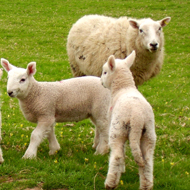Nematodirus warning for north of the UK

Cold weather in April will have delayed hatching of larvae, particularly in the northern half of England and in Scotland.
Nematodirus battus will present a 'serious problem' this spring, according to the latest disease forecast from the National Animal DIsease Information Service (Nadis).
Cold weather in April will have delayed hatching of larvae, particularly in the northern half of England and in Scotland, where there is a very high risk of disease. Lambs born in March and April face significant a challenge as they will start grazing just as the larvae hatch. Similar conditions in 2013 caused serious disease problems.
As hatching will be affected by local conditions, farmers are advised to speak to their vet about the risks in their area. Daily updates can also be found on the SCOPS website (www.scops.org.uk).
Drenching should have been done in early May and potentially again two weeks later to ensure correct timings.
Ewes grazing contaminated pasture should have been treated with persistent anthelmintics before turnout, which will prevent reinfection for several months and reduce the larval challenge for lambs.
Faecal egg counts from rams should be monitored regularly as they are more susceptible to PGE and often graze the same contaminated pasture every year.
Ewes and lambs on safe grazing should not need anthelmintic treatment until lambs are four months old. Pooled faecal egg counts of lambs should guide the timing of treatment.
Benzimidazole (group one) wormers are generally recommended for control of Nematodirus battus, but will be ineffective against other gut parasites.
Nadis recommends taking faecal samples from lambs after prophylactic anthelmintic treatment to ensure adult Nematodirus parasites have been killed and that no eggs are present from other gut parasites.



 The veterinary mental health charity Vetlife is inviting the veterinary community to join it for a sponsored cold-water dip.
The veterinary mental health charity Vetlife is inviting the veterinary community to join it for a sponsored cold-water dip.